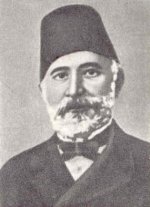The directory «Plots»
Vasa Pashko
(1825—1892)

One figure from northern Albania who played a key role in the Rilindja culture of the nineteenth century was Pashko Vasa (1825-1892), also known as Wassa Effendi, Vaso Pasha, or Vaso Pasha Shkodrani. This statesman, poet, novelist and patriot was born in Shkodra. From 1842 to 1847 he worked as a secretary for the British consulate in that northern Albanian city where he had an opportunity to perfect his knowledge of a number of foreign languages: Italian, French, Turkish and Greek. He also knew some English and Serbo-Croatian, and in later years learned Arabic. In 1847, full of ideals and courage, he set off for Italy on the eve of the turbulent events that were to take place there and elsewhere in Europe in 1848. We have two letters from him written in Bologna in the summer of that revolutionary year in which he expresses openly republican and anti-clerical views. We later find him in Venice where he took part in fighting in Marghera on 4 May 1849, part of a Venetian uprising against the Austrians. After the arrival of Austrian troops on 28 August of that year, Pashko Vasa was obliged to flee to Ancona where, as an Ottoman citizen, he was expelled to Constantinople. He published an account of his experience in Italy the following year in his Italian-language La mia prigionia, episodio storico dell’assedio di Venezia, Constantinople 1850 (My imprisonment, historical episode from the siege of Venice). It is no coincidence that this historical biography bears a title similar to that of the famous memoirs of Italian patriot and dramatist Silvio Pellico (1789-1845), Le mie prigioni (My prisons), published in 1832. In Constantinople, after an initial period of poverty and hardship, he obtained a position at the Ministry of Foreign Affairs, whence he was seconded to London for a time, to the Imperial Ottoman Embassy to the Court of St James’s. He later served the Sublime Porte in various positions of authority. In 1863, thanks to his knowledge of Serbo-Croatian, as he tells us, he was appointed to serve as secretary and interpreter to Ahmed Jevdet Pasha , Ottoman statesman and historian, on a fact-finding mission to Bosnia and Hercegovina which lasted for twenty months, from the spring of 1863 to October 1864. The events of this mission were recorded in his La Bosnie et l’Herzégovine pendant la mission de Djevdet Efendi, Constantinople 1865 (Bosnia and Hercegovina during the mission of Jevdet Efendi). About 1867 we also find him in Aleppo. A few years later he published another now rare work of historical interest, Esquisse historique sur le Monténégro d’après les traditions de l’Albanie, Constantinople 1872 (Historical sketch of Montenegro according to Albanian traditions).
Albania, 1960, Vaso Pasha